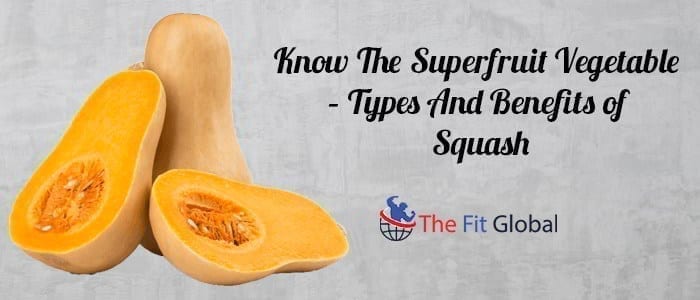Know The Superfruit Vegetable – Types And Benefits of Squash
Squash is a big fruit. A big fruit technically means it is big in size. But squash is huge in many other ways. Squash fruit is uniquely not available, but there are merely a dozen types of it. Squash benefits aren’t bounded to a single area of health, but it is advantageous as similar as superfood seeds. Explore the family of squash, and enjoy the excellent benefits of squash for various health purposes.

Here are the highlights of the presentation:
Health Benefits of Squash
1. Immune System
Immune strength is the only responsible factor for the prevention of many diseases. The basic step for improving immune system strength is to reduce free radicals in the body. During the metabolism, cells release these free radicals, antibodies which are harmful to the body’s activity. To kill them, we need the fighters in the name of antioxidants.
Squash Nutrition has the best answer for this. Squashes are full of vitamins and minerals which help in improving antioxidants and fight well with the inflammations. Anti-fat benefits of squash are also found in its peel. Better choose to eat with skin to reap intense benefits.
2. Heart Health with a baggage of 4 benefits
The heart is connected to many other organs in the body. This is because the whole responsibility of the heart in blood pumping and serving energy to all body parts.
By just saving the heart health, we will be able to protect ourselves from many other problems. Squash benefits us in this case as an ideal food. It has the best utility for such problems.
Summer squash benefits the body with low calories. This enhances the least accumulation of fats and consuming the effective part of the food. Cholesterol and calories in squash fruits are very low.
The effect of low-calorie food gives better room for reduction of blood sugar levels. Insulin resistance gets reduced by the dietary fibers in squash. All these factors help in controlling diabetes effectively.
Calories in Butternut squash are also the least. The best you control the cholesterol, easier is the way to save your heart. So, have the butternut squash in your regular diet.
Higher blood pressure might be caused due to cholesterol majorly. But there are the cases where people get hypertension even with least cholesterol in them. It is just because of the free radicals and high inflammation in the body. The tissues in the blood vessels are relaxed with the potassium and zinc. Of course, health benefits of butternut squash are famous for its minerals.
All the above treatments, however, save the heart’s health, but the vitamins and minerals have the special task to perform. Magnesium prevents in high blood pressure. Vitamin C helps in prevention of accumulation of oxidized cholesterol in the veins. Folate, vitamin B9 controls cholesterol to a large extent.
With this advantages, the heart is said to be safe if we consume squash regularly.
3. Cancers
Preventing the growth of cancer causing cells makes the benefits of squash more profound that it can cover many other severe organ problems too.

Free radicals, at the worst scenario, be it a weak immune system or the ill-healthy diet, cause cancer very quickly. Cancer causing cells may lead to premature aging before the progression of the disease. They may also cause cell division in the process.
But the vitamin C, beta-carotene in squash can save the body from the pollutants and foreign materials which cause cancer. Anti-inflammatory properties due to vitamin C in squash benefits in preventing aging effect, cell division, and many cancers like oral cavities.
4. Digestion
Many people do not intend to eat the foods of cucumber-family in the diets. But they have the easiest digestive abilities than every other food. Enhanced metabolism is the best out of many health benefits of squash.

Healthy digestion can be achieved when we avoid taking the foods which contain bad cholesterols, anti-digestive material. Also, fibers can compensate the harmful effect of fats by enhancing the fast digestion and effective metabolism.
Out of many squash fruits, acorn squash benefits best with the dietary fiber it contains. Bowel movements are regulated well with squash consumption. Constipation has the best organic treatment with the squash.
5. Eyes
As beta-carotene is abundant in squash, it has the primary advantage for the eye health. Another carotenoid, lutein, helps in curing cataracts, macular degeneration, which turns severe with the time. The beta-carotene and lutein are abundant in summer squash and winter squash.
6. Bone Strength
Bone strength is one of the prominent health benefits of squash. Healthy bones require the minerals, calcium, manganese, potassium, and phosphorous, etc. Squash have all of them in right amounts. They help in attaining healthy structure and improving the bone density. Minerals should also be available at high intensity in the organs, which makes the benefits of squash so immense.

Magnesium strengthens joints of bones. Osteoporosis, a severe bone disease can be controlled with sufficient mineral strength, which requires many of the minerals mentioned above
7. Antioxidants
Antioxidants are the fundamental constituents of any cleansing health ingredient. Most of the squash health benefits are mainly due to these antioxidants. Alpha, beta-carotenoids, lutein, omega-3 fatty acids are causes behind the antioxidant effect.
Arthritis can also be reduced in intensity by the regular consumption of squash. The inflammation caused due to diabetes condition can be controlled effectively.
8. PMS
Hormonal disorders are often treated as emotional things. But it is a fact that every emotional and physical disorder is solely dedicated to the physical activity of the brain and various glands. This should be treated by obvious physical means.
More than men, women face the hormonal imbalance and their consequences with more frequency. They are technically named as premenstrual syndrome. Menstrual cramps, mood swings are the common problems that occur along with premenstrual syndrome.
Minerals, manganese, and magnesium are the benefits of squash for reducing the menstrual cramps in women. Summer squash benefits in this case very effectively with its mineral constituents.
9. Lung Health
Cigarette smoking causes a variety of diseases with severe effect. Lung cancer is a major one of them. Taking squash in your regular diet helps in developing a resistance to such diseases. It doesn’t imply that you can continue smoking even with such harm following. Smoking is never good and every single inhalation counts to retard your health condition.
10. Asthma

Apart from the fact of low calories in butternut squash, it is also famous for the rich antioxidants. Beta-carotene is the reason behind it. Although antioxidants are high in all types of squash, butternut squash gets a high rank in preventing problems due to their lack.
Asthma has the most chances to attack when the body lacks antioxidants. Squash can be the rescue in this case. Benefits of squash also cover many respiratory problems.
11. Neural Health
Squash provides sufficient nutrients for neural system growth in children and a pregnant woman because the child they carrying also needs to develop the neural system. Neural tube defects are caused in infants due to lack of vitamin B9, which is constituted in squash as much as necessary.
Add this to your diet as per the need and doctor’s prescription if you are prone to disease, or you already have it. However, eating more can only give you more benefits of squash but nothing harmful.
As we are done with the primary purpose of the article, i.e. benefits of squash, let us now get into some additional details of the squash that might come in handy in your health applications.
One important mention for the better understanding of the above benefits is the squash nutrition facts.
Nutrient power is the only factor that decides the strength of an ingredient in the health world. Squash Nutrition has got a lot of interesting points to tell us.
Skin Benefits of Squash
We all know that there are many skin benefits with cucumber, which is also a member of the squash family, i.e. Cucurbitaceae. Skin disorders due to UV radiation, unhealthy nutrition, harmful chemicals can be easily treated with such foods. Benefits of squash for skin are so effective and long lasting. The minerals, vitamins, antioxidants and the additional squash nutrition facts attribute to the treatment of the skin disorders like dark spots and suntan.
We can see in the squash nutrition that it has more than 3 times of daily recommended value of vitamin A. It gives skin a long lasting elasticity, and cleansing effect.
Dehydrating problems, free radical effects are cured by the water content of the fruit. This, in a way, controls the aging effect on the skin. The detox effect can reduce pigmentation problems, wrinkles on the skin as a gradual effect.
Hair Growth
Hair growth doesn’t seem to fit in the benefits of squash, but there are the nutrients which promote hair health.

The best non-toxic ingredients required for healthy hair viz. vitamin A, beta-carotene are abundant in squash. They help in reducing many hair problems like dandruff, premature graying, thinning of hair, and hair loss.
Squash Nutrition Facts:
There are many a number of different types of squash, which we are going to enlist below. Out of them all, summer squash and winter squash have got the best nutritional properties. Many popular benefits of squash are mainly because of these two types of squash.
Butternut Squash is at the next level after the above two. It also needs a special mention in the huge list of squash nutrition. There is a special mention on the butternut squash nutrition, because of its few peculiar contents.
It gives far more vitamins than the other squash fruits. But, Butternut squash carbs are almost equal to other fruits, i.e. 11 grams per 100 grams of squash weight.
These are the approximated amounts of nutrients available in the squash per 100 grams of weight.
| Supplements | Normal Squash | Butternut Squash |
| Energy | 45 kCal | 41 kCal |
| Carbohydrates | 11.69 g | 11.5 |
| Protein | 1 g | 1 g |
| Fiber | 2 g | 2 g |
| Fats | 100 mg | 1 g |
| Vitamins | Normal Squash | Butternut Squash |
| Vitamin A | 3189 mg | 3400 mg |
| Vitamin C | 21 mg | 16 mg |
| Vitamin E | 1.44 mg | 1.4 mg |
| Vitamin K | .01 mg | .01 mg |
| B-Complex | 2 mg | .2 mg |
| Minerals | Normal Squash | Butternut Squash |
| Calcium | 48 mg | 42 mg |
| Copper | .072 mg | .1 mg |
| Iron | .7 mg | .5 mg |
| Magnesium | 34 mg | 30 mg |
| Phosphorous | 33 mg | 28 mg |
| Zinc | .15 mg | .12 mg |
| Manganese | .202 mg | .2 mg |
Above values of squash nutrition are rounded off to nearest values but do not deviate from the originals.
The reason for the squash nutrition facts and butternut squash nutrition mentioned separately is for a better understanding of the health benefits of butternut squash and other squash types distinctly.
Types of Squash
There are many different kinds of squash, where each squash health benefits are peculiarly different which account for specific health problems in distinct. Know some of the prominent squashes here.
Summer Squash
Summer squash fruits have a tender and edible peel and are very rich in vitamins A, C, B3. They are very rich in water and detoxifying abilities. Some of the summer squashes are crookneck, zucchini, straight neck, and scallop. They are a bit in amateur form, should be eaten after they are ripe. They should not be preserved for more than 5 days in the fridge.
Winter Squash
Winter squash is another versatile fruit from the same family. They have hard and thick skin, rich in vitamins A, C, B2. Some of the winter squashes are spaghetti, acorn, and pumpkin. The skin of this fruit is inedible. Not only for eating, but the peeling of the skin is a must for cooking too.
Winter squashes can be stored for a long time around a month.
Acorn
Acorn squash is a winter squash with full of water, flesh, and fiber. It is available throughout the year. It has edible rinds, and the size is a bit smaller than other squashes.
Butternut Squash
Butternut squash has the highest following out of many squashes. It is of a bell shape, yellow colored, thin-skinned fruit with rich vitamins A, C. The butternut squash has the most abundant constituents of these vitamins, which makes it the best out of all.
There are many other squashes, banana squash, pumpkin, Hubbard, Delicata, tromboncino, etc. All these fruits contain similar nutrients and same squash health benefits without much difference.
However, benefits of squash outstanding are undebatable. Summer squash benefits are so wide with least possible side effects. So, start eating squash from today with your routine diet.



Comments
Leave a Comment